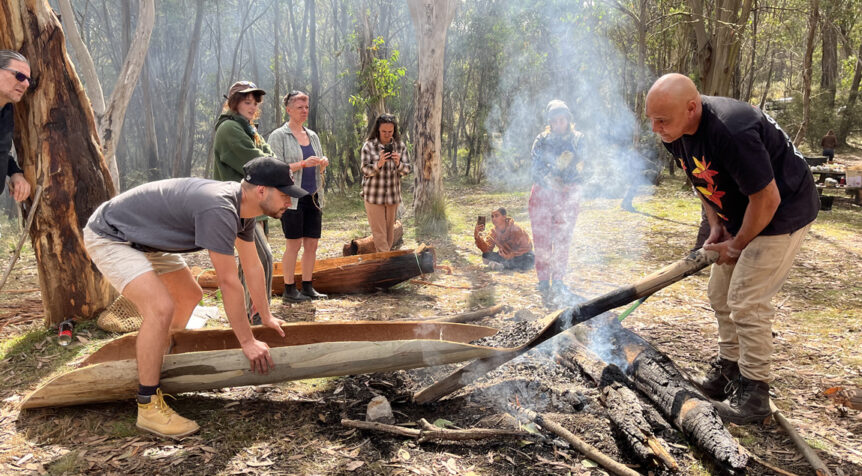The ANU School of Art and Design’s Environment Studio tertiary electives and community programs are the culmination of many dedicated minds, hearts and hands. They are made possible entirely due to the dedication and generous contributions from First Nations staff, artists and cultural educators. These field-based practice-led initiatives provide students from across the ANU with meaningful learning opportunities that encompass aspects of the depth and vibrancy of First Nations cultures. Key values of respect, reciprocity, truth telling, listening and cultural safety are central to the course’s and the emergent community outreach programs’ objectives.
Following an invitation in 2011 from Eden based Yuin Elder, Uncle Ossie Cruse, the ANU School of Art and Design’s Environment Studio has worked closely with local and regional First Nations communities, co-designing two innovative tertiary courses (the Balawan Elective and Buugang Elective) for undergraduate and postgraduate students, across campus. These courses have seeded creative community outreach programs which attract funding by Arts ACT. Key values of respect, reciprocity and shared learning are crucial underpinnings to all tertiary electives and emergent outreach program objectives and inform emergent creative responses and outcomes.
All field-based programs utilise field oriented, practice-based methodologies, and allow students from across the ANU to draw on firsthand experiences with First Nations cultural facilitators. Through being on Country and engaging in active listening and first-hand observations, participants gain vital insights into First Nations knowledges and perspectives, whilst developing creative responses and studio work.
Field trips are supported by weekly tutorials which incorporate discussions, reflections and critical analysis of carefully selected literature. For many participants, it is their first real engagement with truth-telling and sessions frequently include personal insights into lived experiences of racism and the ongoing impacts of colonisation in Australia.
First Nations perspectives and course content can often be challenging, therefore creating a culturally safe environment which supports emotional, mental and physical wellbeing and the opportunity for difficult conversations is a priority.
Since 2015, the courses have been at capacity and student SELT (Student Experience of Learning and Teaching) and written feedback is consistently positive—a testimony to the hunger for this mode of transformational pedagogy.
The Environment Studio Team’s (EST) Balawan Elective and Buugang Elective are internationally unique in their repeat format, field-based delivery. They are co-designed with First Nations staff and collaborators who, alongside non-Indigenous contributors, engage students in culturally safe, respectful and, at times, challenging learning environments.
While camping on Country, participants experience the potency of peer learning and course content directly from local First Nations cultural knowledge holders. Such a format is not only intellectually invigorating and culturally insightful but also enables students to reflect deeply on the immediacy of the ongoing impacts of colonisation in our region, providing a profoundly motivating means to inform creative practice.

Students are drawn from a wide range of disciplines, spanning all visual arts workshops, as well as from the wider University. A healthy respect for diverse perspectives and approaches to the creative process results.
At the heart of these courses are sustained collaborations with contemporary First Nations voices and an unequivocal commitment to including these perspectives, unfiltered.
Field-based educational environments are internationally recognised in promoting transformational pedagogical learning opportunities. The Environment Studio’s First Nations focus and co-delivery of courses and programs, ensures culturally appropriate and safe ways to learn on Country, to foster a more nuanced appreciation of culture, whilst cultivating a diversity of studio practices.
Participant Testimonials
‘It was more than just a course, it was knowledge that I will use for the rest of my life and a reminder to hold myself accountable to continue to learn about country I live on and, most importantly, to listen to First Nations voices to be the best ally I can.’ (Bridget Fitzpatrick, Buugang Elective student email, 2021)
‘As teachers, they transform learning, transform lives, and transform and encourage creative futures between First Nations people and students.’ (Julian Laffan, Sharing Stories Arts Exchange, 2023)
May 2024
Amanda Stuart, Alison Simpson, Shane Herrington and Aidan Hartshorn – the Environment Studio Team.
Credit top photo: Shane Herrington and Aidan Hartshorn, canoe making workshop with Buugang Elective students on Wolgalu Country, 2024 (image, I. Gold)

